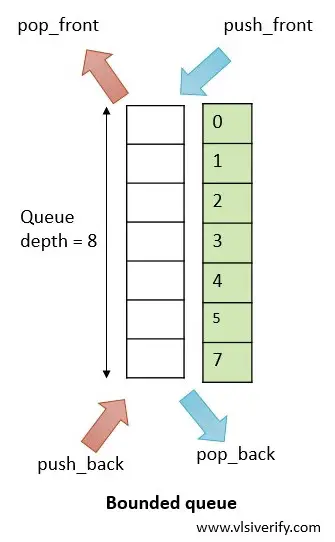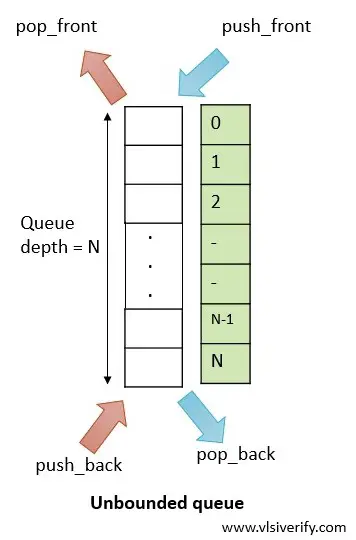SystemVerilog Queues
A queue is a variable size and ordered collection of elements (homogeneous element).
To understand it is considered the same as a single-dimensional unpacked array that grows and reduces automatically if it is a bounded queue.
Types of queues in SystemVerilog
- Bounded queue: Queue having a specific size or a limited number of entries.
- Unbounded queue: Queue having non-specific queue size or unlimited entries.


Declaration of a queue in SystemVerilog
data_type <queue_name> [$];For Example:
bit q_1[$]; // Unbounded queue of bit
byte q_2[$]; // Unbounded queue of byte
int q_3 [$:9]; // Bounded queue with qsize = 10
int q_4[$] = {5,6,7};SystemVerilog Queue methods
|
Methods (functions) |
Description |
|
insert (<index>, <item>) |
Inserts an item at a specified index. |
|
|
|
size() |
If the queue is not empty, return the number of items in the queue. Otherwise, it returns 0. |
|
push_back(<item>) |
Inserts an item at the end of the queue. |
|
pop_back() |
Returns and removes the last item of the queue. |
|
push_front(<item>) |
Inserts an item at the front of the queue. |
|
pop_front() |
Returns and removes the first item of the queue. |
|
shuffle() |
Shuffles items in the queue |
SystemVerilog Queue Example
module queue_example;
// declaration
string animal_q[$];
initial begin
$display("Initial Size: animal_q = %0d", animal_q.size());
animal_q = {"TIGER","LION"};
$display("Size: animal_q = %0d", animal_q.size());
$display("-----------------------");
animal_q.insert(1, "ELEPHANT");
animal_q.insert(3, "FOX");
animal_q.insert(4, "ZEBRA");
$display("Size: animal_q = %0d", animal_q.size());
foreach(animal_q[i]) $display("animal_q[%0d] = %s", i, animal_q[i]);
$display("-----------------------");
$display("--- Access queue item ---");
$display("The second element of animal_q = %s", animal_q[2]);
$display("The fourth element of animal_q = %s", animal_q[4]);
$display("-----------------------");
$display("--- Delete queue item ---");
animal_q.delete(2);
foreach(animal_q[i]) $display("animal_q[%0d] = %s", i, animal_q[i]);
$display("-----------------------");
$display("--- Delete complete queue ---");
animal_q.delete();
$display("Size after queue deletion: animal_q size = %0d", animal_q.size());
$display("-----------------------");
animal_q = {"TIGER","LION"};
$display("--- push_back methods ---");
animal_q.push_back("ELEPHANT");
foreach(animal_q[i]) $display("animal_q[%0d] = %s", i, animal_q[i]);
$display("-----------------------");
$display("--- push_front methods ---");
animal_q.push_front("FOX");
foreach(animal_q[i]) $display("animal_q[%0d] = %s", i, animal_q[i]);
$display("-----------------------");
$display("--- pop_back methods ---");
animal_q.pop_back();
foreach(animal_q[i]) $display("animal_q[%0d] = %s", i, animal_q[i]);
$display("-----------------------");
$display("--- pop_front methods ---");
animal_q.pop_front();
foreach(animal_q[i]) $display("animal_q[%0d] = %s", i, animal_q[i]);
$display("-----------------------");
end
endmoduleOutput:
Initial Size: animal_q = 0
Size: animal_q = 2
-----------------------
Size: animal_q = 5
animal_q[0] = TIGER
animal_q[1] = ELEPHANT
animal_q[2] = LION
animal_q[3] = FOX
animal_q[4] = ZEBRA
-----------------------
--- Access queue item ---
The second element of animal_q = LION
The fourth element of animal_q = ZEBRA
-----------------------
--- Delete queue item ---
animal_q[0] = TIGER
animal_q[1] = ELEPHANT
animal_q[2] = FOX
animal_q[3] = ZEBRA
-----------------------
--- Delete complete queue ---
Size after queue deletion: animal_q size = 0
-----------------------
--- push_back methods ---
animal_q[0] = TIGER
animal_q[1] = LION
animal_q[2] = ELEPHANT
-----------------------
--- push_front methods ---
animal_q[0] = FOX
animal_q[1] = TIGER
animal_q[2] = LION
animal_q[3] = ELEPHANT
-----------------------
--- pop_back methods ---
animal_q[0] = FOX
animal_q[1] = TIGER
animal_q[2] = LION
-----------------------
--- pop_front methods ---
animal_q[0] = TIGER
animal_q[1] = LION
-----------------------Example for shuffle method
Let’s see how the shuffle method shuffles queue’s items.
module queue_example;
// declaration
int num_q[$];
initial begin
for(int i = 0; i < 10; i++) num_q.push_back(i);
$display("--- Before shuffle ---");
foreach(num_q[i]) $display("num_q[%0d] = %0d", i, num_q[i]);
num_q.shuffle();
$display("----------------------");
$display("--- After shuffle ---");
foreach(num_q[i]) $display("num_q[%0d] = %0d", i, num_q[i]);
end
endmoduleOutput:
--- Before shuffle ---
num_q[0] = 0
num_q[1] = 1
num_q[2] = 2
num_q[3] = 3
num_q[4] = 4
num_q[5] = 5
num_q[6] = 6
num_q[7] = 7
num_q[8] = 8
num_q[9] = 9
----------------------
--- After shuffle ---
num_q[0] = 1
num_q[1] = 3
num_q[2] = 9
num_q[3] = 6
num_q[4] = 8
num_q[5] = 5
num_q[6] = 2
num_q[7] = 4
num_q[8] = 0
num_q[9] = 7Array of queues
An array can store queues. In the below example,
array[0] stores a queue of even numbers.
array[1] stores a queue of odd numbers.
array[2] stores a queue of multiple hundreds.
Initialization of array of queues
- Based on array index
array[0] = {2, 4, 6, 8};
array[1] = {1, 3, 5, 7};
array[2] = {100, 200, 300};- Without using an array index
array = '{ {2, 4, 6, 8},
{1, 3, 5, 7},
{100, 200, 300}
};
Array of queues Example
module array_example;
int array [3][$];
initial begin
//array[0] = {2, 4, 6, 8};
//array[1] = {1, 3, 5, 7};
//array[2] = {100, 200, 300};
//or
array = '{ {2, 4, 6, 8},
{1, 3, 5, 7},
{100, 200, 300}
};
// Print array of queues
foreach (array[i,j]) $display("array[%0d][%0d] = %0d", i, j, array[i][j]);
$display("------------------");
array[0].push_back(10);
array[1].push_back(9);
array[2].push_back(400);
$display("After push_back operation");
// Print array of queues
foreach (array[i,j]) $display("array[%0d][%0d] = %0d", i, j, array[i][j]);
end
endmoduleOutput:
array[0][0] = 2
array[0][1] = 4
array[0][2] = 6
array[0][3] = 8
array[1][0] = 1
array[1][1] = 3
array[1][2] = 5
array[1][3] = 7
array[2][0] = 100
array[2][1] = 200
array[2][2] = 300
------------------
After push_back operation
array[0][0] = 2
array[0][1] = 4
array[0][2] = 6
array[0][3] = 8
array[0][4] = 10
array[1][0] = 1
array[1][1] = 3
array[1][2] = 5
array[1][3] = 7
array[1][4] = 9
array[2][0] = 100
array[2][1] = 200
array[2][2] = 300
array[2][3] = 400
System Verilog Tutorials